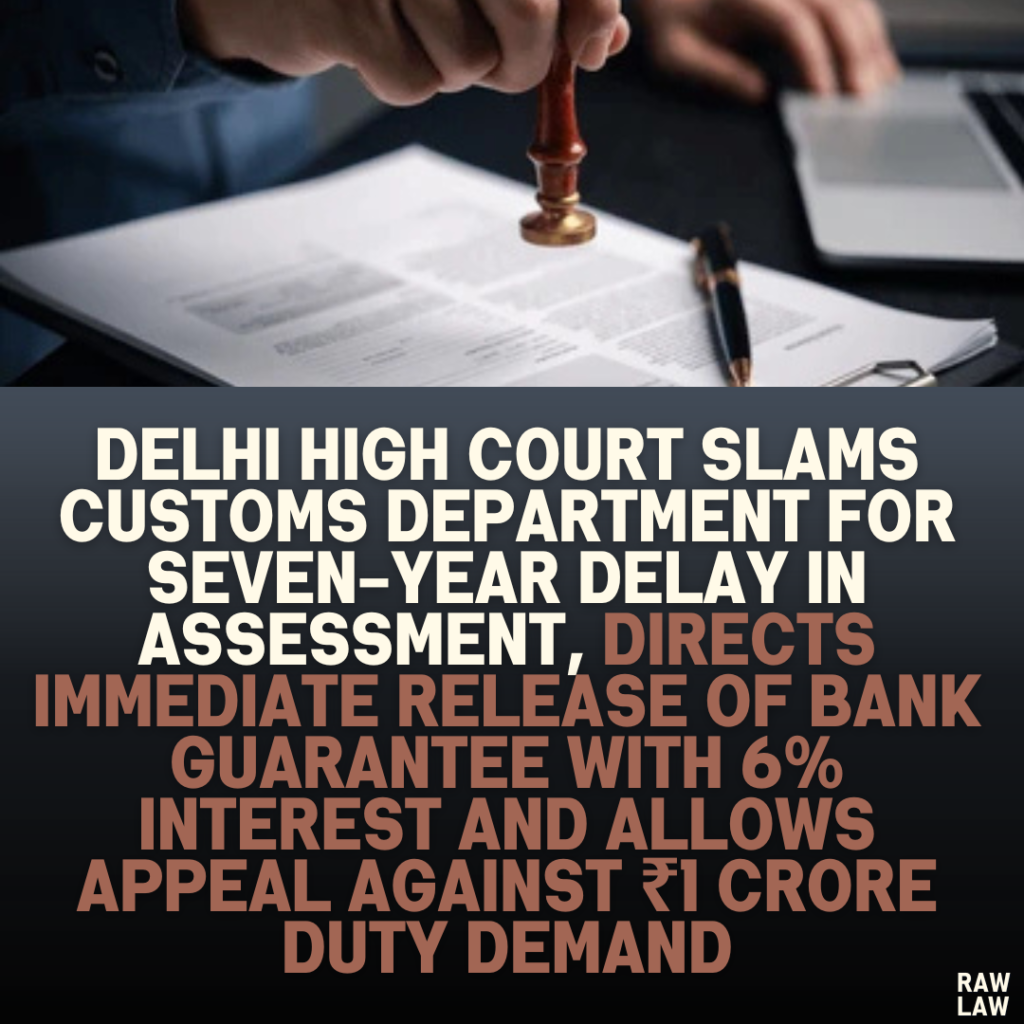Court’s Decision
The Delhi High Court held the Customs Department accountable for its failure to release the petitioner’s bank guarantee (BG) of ₹22,07,264, along with 6% annual interest, despite earlier judicial orders. The Court permitted the petitioner to appeal the final customs assessment order dated February 23, 2024, within 30 days and clarified that the release of the BG and appellate proceedings are independent of each other.
Key Directions:
- The Customs Department must release the BG with accrued interest within 8 weeks.
- The petitioner is allowed to file an appeal against the final assessment within 30 days, with the required statutory pre-deposit.
- The Customs Department cannot link the release of the BG to the outcome of the appeal.
Facts
- The petitioner imported gold jewelry from Indonesia in October 2015, claiming exemptions under two customs notifications:
- Notification No. 46/2011-CU (June 1, 2011)
- Notification No. 12/2012-CE (March 7, 2012)
- In January 2016, Customs authorities suspected issues with the Certificates of Origin (COO) accompanying the import. As a result, they directed the petitioner to submit:
- A bank guarantee (BG) covering 100% of the differential duty.
- A bond for the same.
- In July 2016, provisional assessment proceedings were carried out, but the Customs Department repeatedly delayed finalizing the assessment, despite the petitioner’s requests.
- The delay led the petitioner to file a writ petition (W.P. 11831/2023), where a Division Bench of the Delhi High Court, in its December 2023 order, directed:
- Release of the BG with 6% annual interest (effective from March 17, 2016).
- Completion of assessment proceedings without further delay.
- Despite these directions, the Customs Department did not release the BG. Instead, it issued a final assessment order on February 23, 2024, rejecting the petitioner’s claim for preferential duty and raising demands for customs duty and penalties.
Issues
- Delay in Finalization of Assessment: Whether the Customs Department’s delay in completing the assessment and releasing the BG violated the petitioner’s rights.
- Legality of the Final Assessment Order: Whether the Customs Department’s rejection of the petitioner’s claim for preferential duty benefits was valid.
- Non-Compliance with Judicial Directions: Whether the Customs Department’s failure to implement the earlier High Court order was justified.
Petitioner’s Arguments
- Delay in Assessment: The Customs Department took over seven years to finalize the assessment, which was arbitrary and unjustified.
- Non-Compliance: The Customs Department failed to implement the clear directions of the Division Bench to release the BG with interest.
- Final Assessment Challenge: The petitioner argued that the rejection of preferential duty benefits in the final assessment was legally flawed.
Respondent’s Arguments
- Duty and Penalty Demands: The Customs Department argued that the petitioner owed ₹1,02,68,969 in customs duty and penalties under the final assessment.
- Administrative Lapses: The Department admitted lapses in implementing the Division Bench order but maintained that the final assessment was conducted lawfully.
- Revenue Protection: The Department justified its actions, claiming that releasing the BG before final assessment would have jeopardized revenue collection.
Analysis of the Law
The Court examined provisions of the Customs Act, 1962, including:
- Provisional Assessment (Section 18): It noted that provisional assessments must be finalized within a reasonable time to avoid harassment to taxpayers.
- Interest on Refunds (Section 27A): The petitioner was entitled to 6% interest on the BG amount as per statutory provisions.
- Judicial Compliance: The Court emphasized that non-compliance with judicial directions is a serious matter, undermining the rule of law.
Precedent Analysis
The Court relied on its earlier judgment (December 2023), which directed:
- Immediate release of the BG with interest.
- Completion of the assessment within a reasonable time.
The judgment underscored that administrative delays and non-compliance with judicial orders are arbitrary and unconstitutional.
Court’s Reasoning
- Delay in Assessment: The Court held that the Customs Department’s delay in completing the assessment and releasing the BG was indefensible and caused undue hardship to the petitioner.
- Independent Proceedings: The Court clarified that the release of the BG with interest, as per the Division Bench order, must occur independently of the final assessment proceedings or appeals.
- Non-Compliance: The Court warned that officials responsible for further delays would face personal liability.
Conclusion
The Court disposed of the petition with the following directions:
- Appeal Rights: The petitioner is allowed to challenge the final assessment order within 30 days.
- Release of BG: The Customs Department must release the BG and accrued interest within eight weeks, failing which officials would face personal responsibility.
- Fair Appeal Process: The Commissioner (Appeals) is instructed to decide the appeal impartially, without being influenced by prior judicial orders or departmental lapses.
Implications
- Administrative Accountability: The judgment reinforces the accountability of government departments to comply with judicial directions and statutory obligations.
- Timely Assessments: The case underscores the importance of finalizing provisional assessments within a reasonable time.
- Taxpayer Confidence: By upholding the petitioner’s rights, the judgment sends a strong message that administrative delays and non-compliance will not be tolerated.




Pingback: Bombay High Court Grants Bail to Accused in Drunken Driving Case; Imposes Strict Conditions of ₹50,000 Penalty, Confiscation of License, and Public Awareness Campaign on "Don’t Drink and Drive" - Raw Law
Hello, I believe your web site could possibly be having internet browser
compatibility issues. When I take a look at your blog in Safari, it looks fine however, when opening in Internet Explorer, it has some overlapping issues.
I just wanted to give you a quick heads up! Other than that,
wonderful blog!